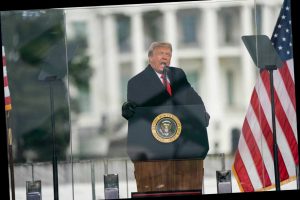What is the Insurrection Act and is it different to martial law?

AMERICA saw protests, riots and natural disasters during the pandemic – with many calling for military assistance throughout.
As Trump's presidency ends and civil unrest grows over Capitol clashes, unfounded rumours have spread suggesting President Trump could deploy the military and federal forces across the US.
Read our US Politics live blog for the latest news on Donald Trump
What is the Insurrection Act?
The Insurrection Act gives the president the power to deploy the military and federal forces across the US.
It was originally passed in 1807 by Congress.
They created the Act to allow the president to use US armed troops and federalised National Guard troops inside its own borders.
However it can only be used to suppress revolutions against the government and prevent civil disorder.
It has never been imposed in the United States on a nationwide basis.
What is the Insurrection Act and is it different to martial law?
Martial Law has no single definition, but it refers to the military assisting the US government in domestic affairs.
It has been declared 60 times in US history – mostly just to help local governments with natural disasters like Hurricane Katrina in 2005.
However, Martial Law can also be used to describe the military replacing civilian government – but this rarely happens.
In this instance, Martial Law suspends the First and Second Amendments of the US constitution, including freedom of speech, freedom of assembly, press freedom and the right to bear arms.
Martial law is limited because of the Posse Comitatus Act from 1878, which stops troops from enforcing domestic law.
It also prevents troops from searching and seizing property or dispersing crowds.
EXCEPTION
The Insurrection Act is an exception to the Posse Comitatus Act.
It gives the US President a specific excuse to use Martial Law – only to restore order and prevent a rebellion against the government.
Other extreme circumstances for the Insurrection Act to cancel out the Posse Comitatus Act is to suppress civil disorder and insurrection.
So, the Insurrection Act is different to Martial Law, it is an exception in the rules that allows the President to deploy troops for domestic reasons.
Has the Insurrection Act been used before?
Yes. The Insurrection Act has been used on dozens of occasions through US history.
The law was used throughout the civil rights era in the 1950s and '60s by three different presidents.
President Dwight Eisenhower received criticism from Arkansas governors in 1957, when US troops were sent to control a protest outside a desegregated school.
However, the Congressional Research Service says since this period, its use has become "exceedingly rare."
It was most recently used in 1992, to suppress riots after the four Los Angeles police officers who beat Black motorist Rodney King.
Can Trump invoke the Insurrection Act?
Trump has the power to use the Insurrection Act if he attempts to diffuse a rebellion or civil unrest through other means first, and is unsuccessful.
A President also cannot invoke the Insurrection Act secretly or ambiguously.
Before doing so, he must ask “the insurgents to disperse and retire peaceably to their abodes within a limited time” – giving people an opportunity to retreat.
He also has to allow Congress and the public to respond to his plans.
According to the text of the Act, it says: "it is lawful for the President of the United States to call forth the militia for the purpose of suppressing such insurrection."
However, after the 2020 election results and President-elect Joe Biden's win, Trump supports called for the Act to be used and many responded by calling it unlawful.
Retired Lt. Gen. Michael Flynn was flown to the White House to discuss his suggestion that President Trump could impose martial law and deploy the military to re-run the election.
However, Army Secretary Ryan McCarthy and Army Chief of Staff Gen. James McConville quickly issued a statement that disavowed Flynn and the use of martial law.
They said: “There is no role for the U.S. military in determining the outcome of an American election.”
Even Trump's legal adviser Jenna Ellis tweeted that using the Act could not pass in the eyes of the law.
She wrote: “We have a constitutional process for the Electoral College and remedies for corrupted elections.
"I totally understand Americans’ passion, but we have to uphold the law, not undermine it."
Can Trump choose to send in troops without governor approval?
The simple answer is, yes.
The law gives examples of instances when the President is required to have approval from a state's governor – but it also gives exceptions.
The Insurrection Act does not need the approval of state governors if the president says that a rebellion or insurgence in a state makes it impossible to enforce US laws.
It also does not need approval if the President can prove citizens' rights are being threatened.
Robert Chesney, a University of Texas law professor, says: "The key point is that it is the president's determination to make."
When the Act was used in the 1960s, objections from state governors were ignored.
Can courts overrule Trump's decision to invoke the Act?
Historically, courts have been reluctant to interfere with a president’s military declarations.
However, they can overrule the Insurrection Act if necessary.
Robert Chesney, a law professor at the University of Texas, explains: “When a president claims that the facts on the ground warrant invocation of the Insurrection Act, courts ordinarily would not second-guess this.”
However, professor Chesney also adds that judges will speak out if they believe Trump is using "false claims" to justify military intervention.
Source: Read Full Article


